#robots from 2006
Explore tagged Tumblr posts
Text

Seekur by Adept MobileRobots (2006)
#robotics#robots#wheeled robots#00s#00s robots#2006#robots from 2006#united states#american robots#adept mobilerobots#mobilerobots#activmedia
0 notes
Text
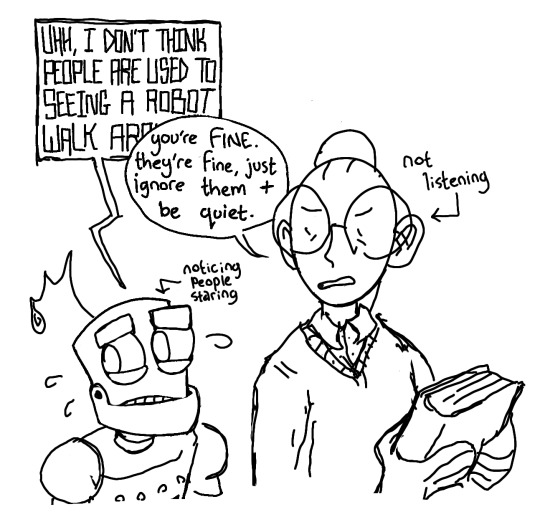
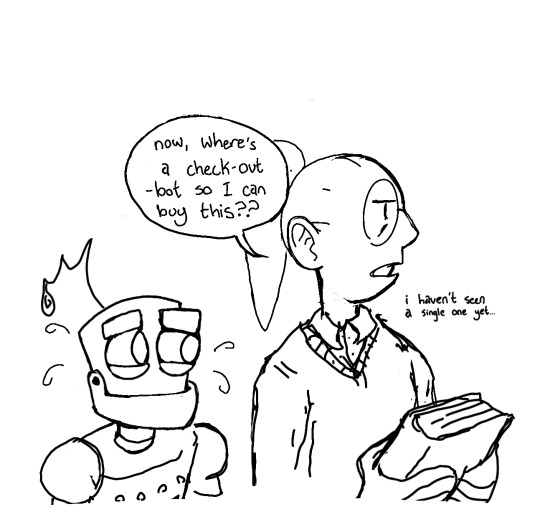
shes not used to robots not being absolutely everywhere
#mmforward#my art#itd be wild to go from an island where everyone around you is a robot#to a typical supermarket in 2006#anywho not my best work but its somethin!
12 notes
·
View notes
Text
It's time to determine by popular vote...
Who is the Hottest Robin Hood?












Row 1 - Robin Hood [Douglas Fairbanks], Robin Hood (1922) - Sir Robin of Locksley [Errol Flynn], The Adventures of Robin Hood (1938)
Row 2 - Robin Fitzhooth [Richard Todd], The Story of Robin Hood and His Merrie Men (1952) - Robin Hood [Sean Connery], Robin and Marian (1976)
Row 3 - Robin of Loxley [Michael Praed], Robin of Sherwood (1984-1986) - Robert of Huntingon [Jason Connery], Robin of Sherwood (1984-1986)
Row 4 - Robin of Locksley [Kevin Costner], Robin Hood: Prince of Thieves (1991) - Jean-Luc Picard [Patrick Stewart], Star Trek: The Next Generation: "Q-Pid" (1991) - Sir Robin of Loxley [Cary Elwes], Robin Hood: Men in Tights (1993)
Row 5 - Sir Robin of Locksley [Jonas Armstrong], BBC's Robin Hood (2006-2009) - Robin Longstride [Russell Crowe], Robin Hood (2010) - Robin Hood [Tom Riley], Doctor Who: "The Robot of Sherwood" (2014)
Fox!Robin Hood from the Disney cartoon his not here because he did not qualify for the tournament proper; do not @ me. For more info see our Oft Asked Questions.
#exit polls#robin hood#douglas fairbanks#errol flynn#richard todd#sean connery#michael praed#jason connery#kevin costner#patrick stewart#jean luc picard#cary elwes#jonas armstrong#russell crowe#tom riley#robin hood 1922#the adventures of robin hood 1938#robin hood 1938#the story of robin hood and his merrie men#robin hood 1952#robin and marian#robin of sherwood#robin hood prince of thieves#robin hood men in tights#star trek the next generation#bbc robin hood#robin hood 2010#doctor who#the robot of sherwood#fuck that medieval man
549 notes
·
View notes
Text
Stuff that actually happens in Bionicle:
Sexy snakes invent capitalism and then face severe regulation by a bunch of demonic mad scientists.
One of said mad scientists impersonated the mayor of a Frutiger Aero dystopia and put all of the citizens into The Pokéballs That Make You Smaller.
There are six fish-themed warlords with (for the most part) really on-the-nose names. They weren't always fish-themed, they just happened to be in a prison that became flooded with The Water That Makes You A Fish. Their main underling is a four-armed squid-man, who is naturally immune to The Water That Makes You A Fish.
The setting's equivalent of Hephaestus made a bunch of useful stuff, including but not limited: to the first six protagonists, the leader of the Bionicle CIA, some cool planes, and the Bionicle CIA's prison-warden robots.
One of the Magic Frisbees that are the central macguffins of the 2004 arc was stuck between the teeth of the Bionicle equivalent of The Bloop.
Some shark guys who were the antagonists of the 2006 arc got put into the Water That Makes You A Fish. They got turned into eels.
There's an entire group of heroes who were brought together to protect the mad scientist I mentioned earlier, then got turned into tiny lizard creatures by one of the sexy snakes, and they didn't get turned back until thousands of years later.
A random villager from an underwater city (which is directly next to the prison that got flooded with the Water That Makes You A Fish) was transformed by the main macguffin into said prison's jailer, who by that point had already been dead for several millenia after being shanked by the blue fish-themed warlord.
There's a substance called Black Fire, which isn't literally black fire. The CIA's warden robots are filled with (and presumably powered by) it, and can shoot it out of their giant impractical swords.
The Makuta devolution scene.
Bionicle Frankenstein's name can also refer to his private island and also a giant plant monster.
724 notes
·
View notes
Text
I love the running gag of Tim Drake getting caught up in Cult Activities:
1) In his 1991 mini series - his first ever solo adventure? Gets caught up in King Snake’s bs which is often stems from the dude wanting to rule the Kobra Cult (Tim has to deal with the jerk on and off as Robin due at least in part to this obsession of the Kobra Cult).
2) Then in Robin (1993) #82 Tim meets Danny Temple and is like hmmm, something weird is going on with this dude. Then in issue #88, Danny is kidnapped by a robot with a snake on it. Then has to deal with the Kobra Cult from issues #89-92.
3) In Batman: Contagion (1996) the Order of St. Dumas, which is a religious cult, releases the biological weapon “The Clench” which Tim catches and then has a rough time cuz of it.
4) AND Tim’s practically a cult leader himself in the Titans Tomorrow (2004) future timeline and present Tim has to deal with his evil cult leader future self.
5) While Tim does not directly interact with the Cult of Conner in 2006 (52 #11, 13, 14) Cassie Sandsmark is a member which we can assume impacted him indirectly.
6) In the resurrection of Ra’s al Ghul (2008) Ra’s wants to either recruit Tim or take over his body and messes him up a bit, both physically and mentally and Ra’s is very much running a cult.
7) In the 2009 Red Robin run Tim is forced to work with Ra’s and the League of Assassins against another cult: The Council of Spiders who kill two of his allies and cause him to lose his spleen.
8) In Robin War (2016) #2 Damian has temporarily joined The Court of Owls and fights Tim
9) Then in Batman: Urban Legends #4 (2021) he meets up with his HS friend Bernard Dowd who gets kidnapped by the cult: Children of Dionysus.
10) And in Tim Drake: Robin #8 Tim Drake has to deal with Children of Dionysus again alongside Bernard who is now his boyfriend.
That’s ten just off the top of my head and I could be missing some (please let me know if I have!) but it’s like the writers are like Tim hasn’t had anything too bizarre to deal with in a little while… Hmm, you know what Tim could use? Another cult to deal with lol
Poor boy must be so tired of dealing with cults
At this point I’m just waiting for a plot line where Tim finds himself as an unwilling cult leader or is unwillingly made the face of a cult 😭 like that time Wally West was in “Blood Will Run” (2001)
#tim drake#robin#robin iii#red robin#robin 1991#robin 1993#bernard dowd#king snake#kobra cult#Batman: contagion#order of st. dumas#the clench#titans tomorrow#cult of conner#resurrection of ra’s al ghul#league of assassins#council of spiders#batman: urban legends#ra’s al ghul#children of dionysus
301 notes
·
View notes
Text
Deaths of Jason Todd
Part of the Batfam Death Project.
Jason has died five times. There are also a further three times when he might have arguably died. I have not found any instances of Jason visiting the afterlife without being dead.
Total time dead: 6 months, give or take a few days.
Verifiable deaths
1. Killed by the Joker in Ethiopia (Batman 1:427–428, 1988)
As we all know, Jason was killed by the Joker (Batman 1:427–428, 1988).

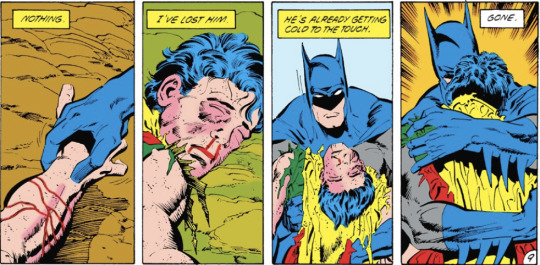
He went to Heaven (Green Arrow 3:7, 2001).

He woke up in his coffin six months later because something something Superboy Prime (Batman Annual 25, 2006),


and was restored from catatonia by Talia via the Lazarus Pit (also Batman Annual 25).


Time dead: probably around six months, but it’s complicated.
2. Killed by Batman to release him from demonic possession (Trinity 2:15, 2017)
Circe and Ra’s al Ghul worked together to get the Outlaws (Jason, Artemis, and Bizzaro) possessed by demons from the Pandora Pits intent on sacrificing Batman, Wonder Woman, and Superman. Bruce injected a possessed Jason with potassium chloride to kill him, forcing the demon out, then restarted his heart by defibrillation.

(This comic also features Superman and Constantine climbing through a portal to hell in possessed!Jason’s mouth.)
Time dead: a minute or so.
3. Beaten to death by groblins (Dark Nights: Death Metal 7, 2021)
Jason, along with other members of the Batfamily, was overwhelmed by a swarm of ‘groblins’: mindless evil Jokerised Robins invading from the Dark Multiverse, led by the Robin King (an evil child Bruce Robin).

Shortly after that he was raised as a zombie (missing an arm) by Black Lantern Batman to continue the fight.
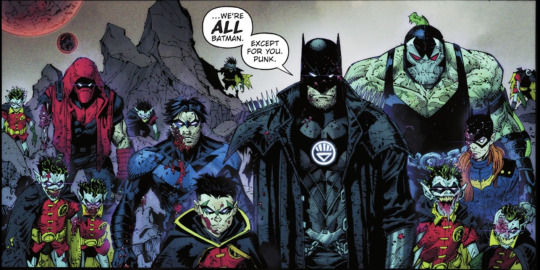
Jason was restored to proper life when Wonder Woman, powered by the determination of her friends, defeated the evil Batman Who Laughs and persuaded the gods to remake the multiverse as it was before the evil universes invaded the good ones.
Time dead: somewhere from quarter of an hour to an hour? Or perhaps a lot longer, if it took longer to rebuild the world. It’s always a little tricky to be sure when world remakes are involved.
4. Shot in the back by zombie Deadshot (Task Force Z 3–4, 2022)
Jason joined a team of zombies called Task Force Z, an organisation run by Harvey Dent with questionably legitimate government backing and copious quantities of Lazarus resin to bring them back every time they died. He was sent to recruit Deadshot by raising him from the dead. Apparently some fool buried Deadshot’s wrist guns with him, because the first thing Deadshot did on being resurrected was to shoot Jason in the back.

Jason was rushed back to the organisation’s facility but flatlined on the operating table.

He was revived by an injection of Lazarus resin into the brain (or possibly just the outer ear? picture is unclear), administered by one of the staff of the questionably legitimate facility.

Time dead: less than a minute.
5. Killed by the Batman of Zur-En-Arrh (Batman 3:148, 2024)
Batman’s dissociation backup personality, called Zur-En-Arrh, turned evil and downloaded itself into a robot. It fought Batman and Jason jumped in to save him; Zur took him out with a stong uppercut to the jaw, smashing his facemask, and threw him down hard, which broke his neck and killed him.

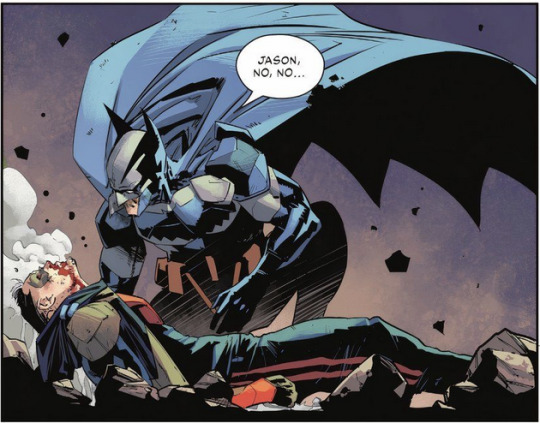

This was a setup by Bruce and Jason: Jason was wearing a special suit that injected him with Lazarus resin, so he was revived almost instantly, while having killed someone caused Zur-En-Arrh to crash.
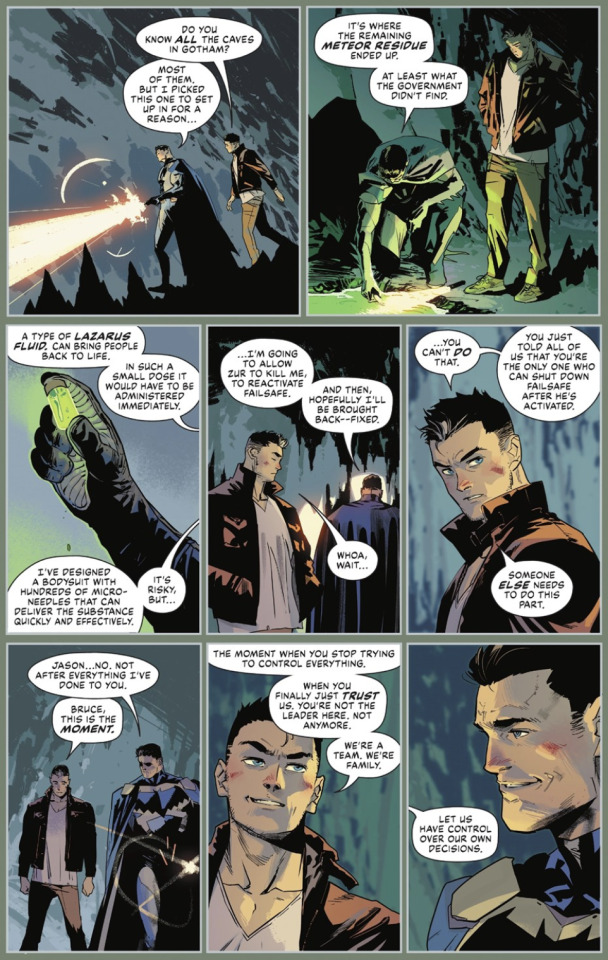

Time dead: a few seconds.
Inferrable and arguable deaths
1. Arguably died when Joker takes over the world (Emperor Joker, 2000)
After the Joker stole reality-altering powers from Mxyzptlk and remade the universe to his liking, he placed Jason’s rotting corpse alongside Dick’s and Tim’s for a macabre poker game.

Emperor Joker was published in 2000, well before Jason was revealed to be alive in the Under the Hood storyline, published in 2006 (and later retconned to have been present in the Hush storyline in 2003), and absolutely before any writer had conceived of bringing him back to life. But given that he is supposed to have been shambling around as a zombie and then getting assassin training for a long while before that, taking the retcons into account he ought to have been alive at the time of Emperor Joker.
So while at the time of writing Jason was intended to be continuously dead, after the retcons we have to say that Joker killed Jason again, perhaps even unknowingly, to put him in his poker game.
After Joker was defeated, Mr Mxyzptlk, with Spectre!Hal’s guidance, restored the world to its previous state, which presumably also involved restoring Jason to life again.
Time dead: it’s complicated.
2. Perhaps dies in the confrontation with Bruce involving the Joker (Batman 1:650, 2006)
When he returned to Gotham as the Red Hood, Jason engineered a confrontation between himself, Batman, and the Joker. Batman ended up throwing a batarang which clipped his shoulder. (Jason had previously in this story monologued about how shoulder wounds can kill quickly from blood loss but are easily treated if you’re quick.) Then the Joker shot the explosives Jason had set and the building blew up.
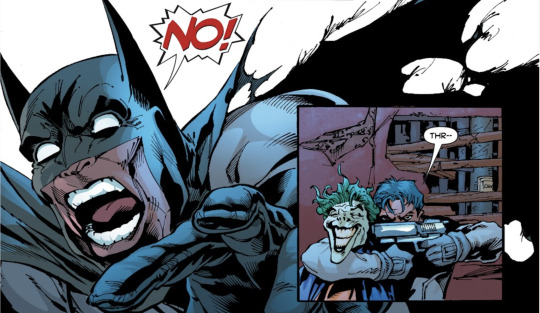
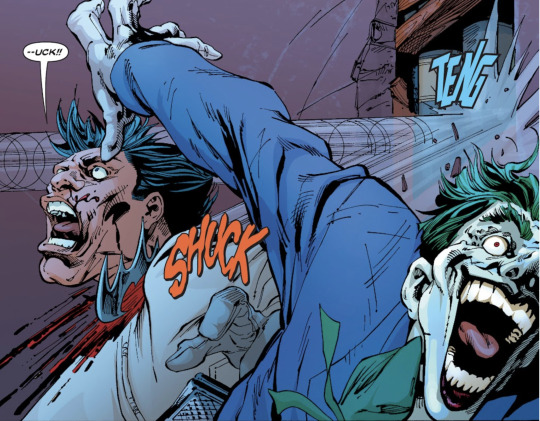
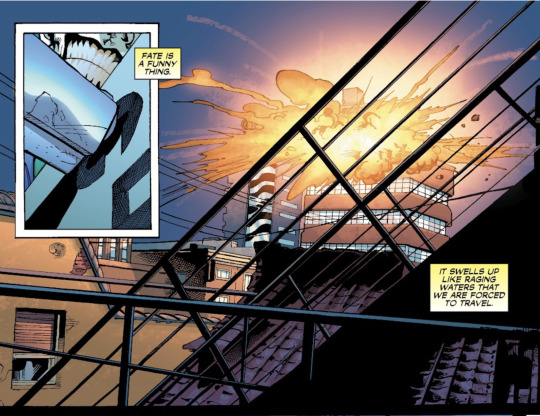
Batman presumably assumes Jason is dead (Jason and Joker were right on top of a large pile of explosives – in fact, it’s pretty amazing even Bruce, who was standing a few feet away, managed to get out). So no-one is around to rescue and treat Jason. But Jason returns later with no explanation of how he survived. Either he’s returned from the dead again or he is supernaturally good at not dying.
Then again, the Joker survived too, so who knows?
Time dead: unknown, if any.
3. Perhaps dies when Dick throws him off a bridge into Gotham River (Batman: Battle for the Cowl 3, 2009)
After Jason nearly killed both Tim and Damian, during the Battle for the Cowl while Bruce was lost in time, Dick confronted him in a battle which ended up on top of a train going over a high bridge. Dick knocked Jason off the train, and they ended up on the bridge with Jason dangling off the edge.
Dick did the whole ‘Take my hand’ thing and Jason said “I’ll be seeing you sooner than you think,” before letting go and dropping into the water from a great height.
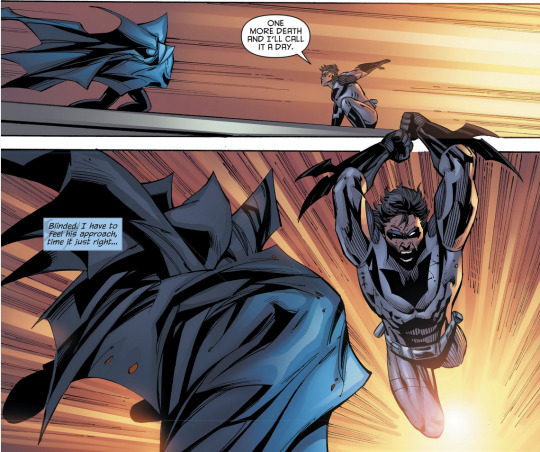


This suggests either Jason knows he’s going to come back from the dead or Jason thinks Dick is going to die soon. Dick definitely reacts as if he thinks Jason is dead, and Dick probably has a pretty generous idea of what’s survivable when it comes to heights.
Again, Jason returns later with no explanation.
Time dead: unknown, if any.
Batfam Death Project Masterpost
#batfam death project#deaths of jason todd#jason todd#corpses#blood and gore#I will edit this post if I find any further deaths for Jason
159 notes
·
View notes
Text

Nam June Paik (1932-2006) — "Uncle" (from the series Family of Robots) [television casings, electronic components, speaker cone, cathode-ray tube, metal, enamel paint, ten cathode-ray tube televisions and video 1986]
3K notes
·
View notes
Text
(I think we all know this is a race between "Rose" and "The Eleventh Hour." But I included the other major recommended starting episodes just to see how this goes.)
#doctor who#classic doctor who#15th doctor#13th doctor#12th doctor#11th doctor#10th doctor#9th doctor#4th doctor#3rd doctor#1st doctor
295 notes
·
View notes
Text
Babylon Zoo - Spaceman 1996
"Spaceman" is a song by British rockband Babylon Zoo, released on 15 January 1996 as the lead single from their debut album, The Boy with the X-Ray Eyes. Featuring heavily distorted guitars and metallic, robotic sounding vocals, the song entered the UK Singles Chart at number one following its use in a Levi's jeans television advertisement the previous year; "Spaceman" was the sixth song to reach number one in the UK after being featured in a Levi's advert.
It became the fastest-selling debut single in British pop music history, and the best-selling single in the UK in over thirty years, since the Beatles' "Can't Buy Me Love". "Spaceman" became a number one chart hit in 23 countries. MTV UK ranked "Spaceman" as the number-24 single of the 1990s. It was voted number 31 in a 2006 Channel 4 poll of the 50 best songs by one-hit wonders.
"Spaceman" recieved a total of 37,6% yes votes.
youtube
448 notes
·
View notes
Text



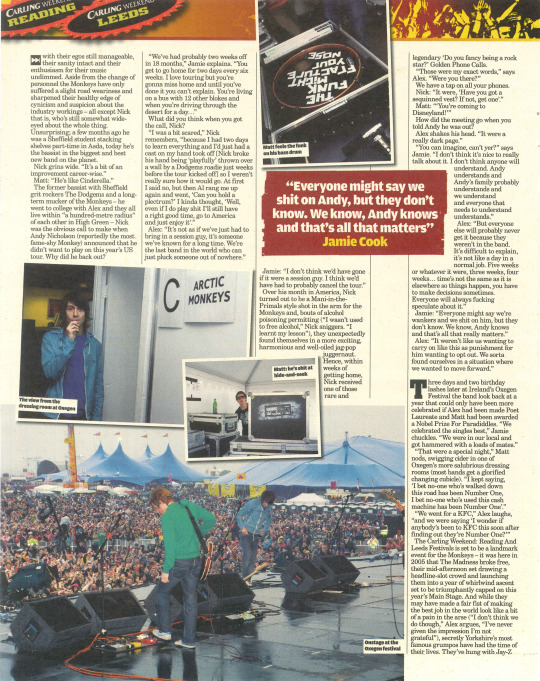
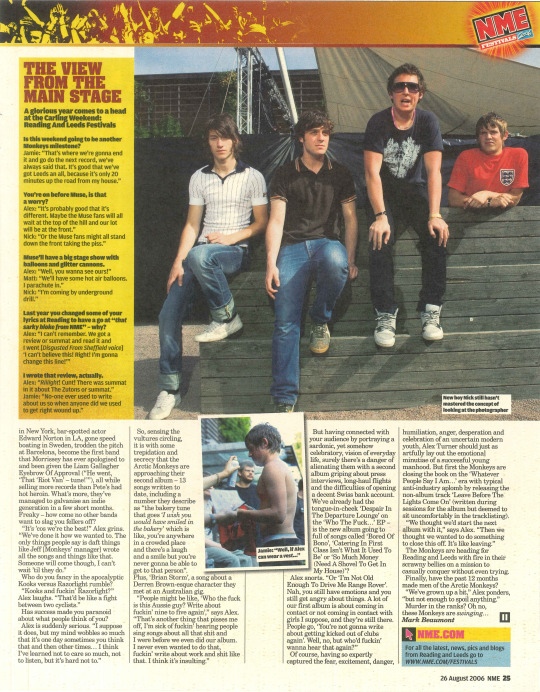
arctic monkeys for nme, 26 august 2006
From the Rubble to Reading
A year since Carling Weekend: Reading And Leeds Festivals made them massive, Arctic Monkeys return with a new member and a message for anyone who reckons they're over
By Mark Beaumont
Photos: Dean Chalkley
Crack! Swipe! Stab! Ten minutes to stage time at Gothenburg's Accelerator festival, the Arctic Monkeys come within inches of actual inter-band slaughter. As the band sit in a backstage patio area, somewhat dour-faced, necking lager, without warning drummer Matt Helders grabs a glass beer bottle from the bucket, bashes it open on a wooden bench and, brandishing it like a rapier blade, lunges at Alex Turner's throat.
We know there've been ructions in the Monkeys camp, but is it all to end in murderous Pils-based bloodshed on a patch of car park in Sweden?
Well, no, it's just a little warm-up horseplay brought on by the nerve-wracking tedium of The Road. But it's the reaction that jars — the bottle stops inches from his jugular but Alex doesn't flinch; he simply lifts a lip in his trademark withering sneer and returns to glumly glugging his lager.
The thunderous sound of nobody laughing would speak volumes to the gossip-mongers and back-biters. See, word is the Arctic Monkeys are over.
They've stiffed, crumbled, cracked under pressure, flashed in the pan. Debut album 'Whatever People Say I Am, That's What I'm Not', after record-breaking, rock-rejuvenating first-week sales (already declared the best-selling album of 2006, in its first week it sold 363,000 copies making it the fastest-selling debut in the UK and, in the process, earning a Nationwide Mercury Prize nomination) has slipped out of the Top 40 only six months since its release in an era when the likes of Kaiser Chiefs and Hard-Fi are racking up a year in the charts. Their rocketing rise has spluttered, its momentum snuffed by the wilful self-hobbling of releasing the non-chart eligible Who The Fuck Are Arctic Monkeys?' EP in April. They've already lost one member — bassist Andy Nicholson, who was replaced by Nick O'Malley after refusing to tour the US this spring pleading "fatigue" — proof if any were needed that it was all too much, too soon. They were forced to run in the big sheds before they could walk in the theatres and what's more, Muse are going to stomp their grumpy Yorkshire mugs into Carling Weekend: Reading And Leeds Festival dust with their gigantic robot alien metaboots.
Monkeymania is dead, that's what they say. And all because they wouldn't play the game.
“If we’d been a bit older it probably would all have been more of a headfuck” Alex
"What do you want us to do?" guitarist Jamie Cook shrugs, utterly un-bovvered. "Milk it like every other band does? We coulda really milked it but we didn't and no matter if you love us or you hate us you can never say a bad thing about how we've gone about pushing our music. We kept ourselves to ourselves. We coulda carried on, released every song off the fuckin' album.."
"If we were a bit older it probably would all have been more of a headfuck," adds Alex Turner, quietly. "We were just young, worked for a bit but then we ended up in this, so I didn't take it that seriously or think it were the end of the world if it all ended. If we were a few years older, with a few more responsibilities and that, we woulda thought, 'We've got to make this right' and that woulda ultimately destroyed us because we'd have ended up putting our singles back out and doing all the bollocks that everybody does, but we weren't obligated to do all that stuff because we had nowt to lose."
How do you respond to the argument that you're a flash in the pan compared to the likes of the Kaisers?
Jamie: "What, because they keep putting advertisements out? I'm not slagging them off, we've met the Kaiser Chiefs a few times and they are nice guys and they've done really well. We're ignorant little shits."
Alex: "You see other bands knocking about at festivals and the looks on their faces... In return for someone perceiving you as big I don't want my face to look like that, because I feel wonderful."
Are you disappointed the momentum hasn't continued?
"Nah!" Alex splutters. "What do you want, fuckin' Shea Stadium?"
"People keep going on about breaking America, says Jamie. "I'm like, 'What you on about?' We went out to America and played to 3,500 in Arizona in the middle of fuckin' nowhere with cactuses inside the venue. We went out there and played a sell-out tour. If we can do that every time then we've broke America for me."
Alex: "But then what? What is there? 'Are you gonna break the moon?'”
How are things in the Monkeys camp now?
Jamie grins broadly. "Wonderful."
"Well, I don't know." Alex drawls. tipping him a comedy Wink Of Death. "You're next."
“People might be like, ‘Write about nine to five again’...I’m sick of fuckin’ people singing songs about all that shit” Alex Turner
Contrary to popular tittle-tattle, i'sa talkative and relaxed Arctic Monkeys that settle on a bench by a river in Gothenburg's Tragarn Gardens — slightly older (Nick celebrates his 21st birthday today, closely followed by Jamie in three days' time), hugely wiser, no longer the prickly young upstarts turning their noses up at the faintest whiff of a Dictaphone. Far from a band in crisis they seem relieved that the hype storm has passed. and that they weathered it with their egos still manageable, their sanity intact and their enthusiasm for their music undimmed. Aside from the change of personnel the Monkeys have only suffered a slight road weariness and sharpened their healthy edge of cynicism and suspicion about the industry workings — all except Nick that is, who's still somewhat wide-eyed about the whole thing Unsurprising; a few months ago he was a Sheffield student stacking shelves part-time in Asda, today he's the bassist in the biggest and best new band on the planet.
Nick grins wide. "It's a bit of an improvement career-wise."
Matt: "He's like Cinderella."
The former bassist with Sheffield grit rockers The Dodgems and a long-term mucker of the Monkeys — he went to college with Alex and they all live within "a hundred-metre radius" of each other in High Green — Nick was the obvious call to make when Andy Nicholson (reportedly the most fame-shy Monkey) announced that he didn't want to play on this year's US tour. Why did he back out?
“We’ve had probably two weeks off in in 18 months," Jamie explains. You get to go home for two days every six weeks. I love touring but you're gonna miss home and until you've done it you can't explain. You're living on a bus with 12 other blokes and when you're driving through the desert for a day..."
What did you think when you got the call, Nick?
"I was a bit scared," Nick remembers, "because I had two days to learn everything and I'd just had a cast on my hand took off [Nick broke his hand being 'playfully' thrown over a wall by a Dodgems roadie just weeks before the tour kicked off] so I weren't really sure how it would go. At first I said no, but then Al rang me up again and went, 'Can you hold a plectrum?' I kinda thought, 'Well, even if I do play shit I'll still have a right good time, go to America and just enjoy it'."
Alex: "It's not as if we've just had to bring in a session guy, it's someone we've known for a long time. We're the last band in the world who can just pluck someone out of nowhere."
Jamie: "I don't think we'd have gone if it were a session guy. I think we'd have had to probably cancel the tour."
"Everyone might say we shit on Andy, but they don't know. We know, Andy knows and that's all that matters" Jamie Cook
Over his month in America, Nick turned out to be a Mani-in-the-Primals style shot in the arm for the Monkeys and, bouts of alcohol poisoning permitting ("I wasn't used to free alcohol," Nick sniggers. "I learnt my lesson"), they unexpectedly found themselves in a more exciting, harmonious and well-oiled jag-pop juggernaut. Hence, within weeks of getting home, Nick received one of those rare and legendary Do you fancy being a rock star?' Golden Phone Calls.
"Those were my exact words," says Alex. "Were you there?"
We have a tap on all your phones.
Nick: "It were, 'Have you got a sequinned vest? If not, get one'."
Matt: "You're coming to Disneyland!""
How did the meeting go when you told Andy he was out?
Alex shakes his head. "It were a really dark page."
"You can imagine, can't yer?" says Jamie. "I don't think it's nice to really talk about it. I don't think anyone will understand. Andy understands and Andy's family probably understands and we understand and everyone that needs to understand understands."
Alex: "But everyone else will probably never get it because they weren't in the band. It's difficult to explain, it's not like a day in a normal job. Five weeks or whatever it were, three weeks, four weeks... time's not the same as it is elsewhere so things happen, you have to make decisions sometimes. Everyone will always fucking speculate about it "
Jamie: "Everyone might say we're wankers and we shit on him, but they don't know. We know, Andy knows and that's all that really matters."
Alex: "It weren't like us wanting to carry on like this as punishment for him wanting to opt out. We sorta found ourselves in a situation where we wanted to move forward."
Three days and two birthday lashes later at Ireland's Oxegen Festival the band look back at a year that could only have been more celebrated if Alex had been made Poet Laureate and Matt had been awarded a Nobel Prize For Paradiddles.
"We celebrated the singles best," Jamie chuckles. "We were in our local and got hammered with a loads of mates."
"That were a special night," Matt nods, swigging cider in one of Oxegen's more salubrious dressing rooms (most bands get a glorified changing cubicle). "I kept saying, ‘I bet no-one who's walked down this road has been Number One, I bet no-one who's used this cash machine has been Number One?"
"We went for a KFC," Alex laughs, "and we were saying 'I wonder if anybody's been to KFC this soon after finding out they're Number One?""
The Carling Weekend: Reading And Leeds Festivals is set to be a landmark event for the Monkeys — it was here in 2005 that The Madness broke free, their mid-afternoon set drawing a headline-slot crowd and launching them into a year of whirlwind ascent set to be triumphantly capped on this year's Main Stage. And while they may have made a fair fist of making the best job in the world look like a bit of a pain in the arse ("I don't think we do though," Alex argues, "I've never given the impression I'm not grateful"), secretly Yorkshire's most famous grumpos have had the time of their lives. They've hung with Jay-Z in New York, bar-spotted actor Edward Norton in LA, gone speed boating in Sweden, trodden the pitch at Barcelona, become the first band that Morrissey has ever apologised to and been given the Liam Gallagher Eyebrow Of Approval ("He went, "That 'Riot Van' — tune!'"), all while selling more records than Pete's had hot heroin. What's more, they've managed to galvanise an indie generation in a few short months. Freaky - how come no other bands want to slag you fellers off?
"It's 'cos we're the best!" Alex grins. "We've done it how we wanted to. The only things people say is daft things like Jeft Monkeys manager wrote all the songs and things like that. Someone will come though, I can't wait 'til they do."
Who do you fancy in the apocalyptic Kooks versus Razorlight rumble?
"Kooks and fuckin' Razorlight?" Alex laughs. "That'd be like a fight between two cyclists."
Has success made you paranoid about what people think of you?
Alex is suddenly serious. "I suppose it does, but my mind wobbles so much that it's one day sometimes you think that and then other times... I think I've learned not to care so much, not to listen, but it's hard not to."
So, sensing the vultures circling, it is with some trepidation and secrecy that the Arctic Monkeys are approaching their second album — 13 songs written to date, including a number they describe as "the bakery tune that goes ‘I wish you would have smiled in the bakery' which is like, you're anywhere in a crowded place and there's a laugh and a smile but you're never gonna be able to get to that person".
Plus, 'Brian Storm', a song about a Derren Brown-esque character they met at an Australian gig.
"People might be like, "Who the fuck is this Aussie guy? Write about fuckin' nine to five again," says Alex. "That's another thing that pisses me off, I'm sick of fuckin' hearing people sing songs about all that shit and I were before we even did our album. I never even wanted to do that, fuckin' write about work and shit like that. I think it's insulting."
But having connected with your audience by portraying a sardonic, yet somehow celebratory, vision of everyday life, surely there's a danger of alienating them with a second album griping about press interviews, long-haul flights and the difficulties of opening a decent Swiss bank account. We've already had the tongue-in-cheek Despair In The Departure Lounge' on the ‘Who The Fuck…’ EP — is the new album going to full of songs called 'Bored Of Bono', 'Catering In First Class Isn't What It Used To Be' or 'So Much Money (Need A Shovel To Get In My House)'?
Alex snorts. "Or 'I'm Not Old Enough To Drive Me Range Rover'. Nah, you still have emotions and you still get angry about things. A lot of our first album is about coming in contact or not coming in contact with girls I suppose, and they're still there. People go, 'You're not gonna write about getting kicked out of clubs again'. Well, no, but who'd fuckin' wanna hear that again?"
Of course, having so expertly captured the fear, excitement, danger, humiliation, anger, desperation and celebration of an uncertain modern youth, Alex Turner should just as artfully lay out the emotional minutiae of a successful young manhood. But first the Monkeys are closing the book on the 'Whatever People Say I Am…’ era with typical anti-industry aplomb by releasing the non-album track 'Leave Before The Lights Come On' (written during sessions for the album but deemed to sit uncomfortably in the tracklisting).
"We thought we'd start the next album with it," says Alex. "Then we thought we wanted to do something to close this off. It's like leaving."
The Monkeys are heading for Reading and Leeds with fire in their scrawny bellies on a mission to casually conquer without even trying.
Finally, have the past 12 months made men of the Arctic Monkeys?
"We've grown up a bit," Alex ponders, "but not enough to spoil anything."
Murder in the ranks? Oh no, these Monkeys are swinging…
The View From the Main Stage
A glorious year comes to a head at the carling Weekend: Reading And Leeds Festivals
Is this weekend going to be another Monkeys milestone? Jamie: "That's where we're gonna end it and go do the next record, we've always said that. It's good that we've got Leeds an' all, because it's only 20 minutes up the road from my house."
You're on before Muse, is that a worry? Alex: "It's probably good that it's different. Maybe the Muse fans will all wait at the top of the hill and our lot will be at the front." Nick: "Or the Muse fans might all stand down the front taking the piss."
Muse'll have a big stage show with balloons and glitter cannons. Alex: "Well, you wanna see ours!" Matt: "We'll have some hot air balloons. I parachute in." Nick: "I'm coming by underground drill."
Last year you changed some of your lyrics at Reading to have a go at "that sarky bloke from NME" — why? Alex: "I can't remember. We got a review or summat and read it and I went [Disgusted From Sheffield voice] ‘I can't believe this! Right! I'm gonna change this line!""
I wrote that review, actually. Alex: "Riiiight! Cunt! There was summat in it about The Zutons or summat." Jamie: "No-one ever used to write about us so when anyone did we used to get right wound up."
#my scans#bands#arctic monkeys#alex turner#jamie cook#matt helders#nick o'malley#wpsia era#nme#interviews#eye contact#very nme interview honestly. but some really good bits#lovee when they talk about still being friends w andy..🥺#the opening paragraphs are such fanfiction i kind of want it to be real
92 notes
·
View notes
Text

Ubiko by tmsuk (2006)
#robotics#wheeled robots#humanoid robots#dual arm manipulators#japan#japanese robots#00s robots#robots from 2006#service robots#tmsuk#00s#2006#robots
0 notes
Text
Anyone who collects physical media is aware of disc rot, but recently news broke that Region 1 Warner Bros. media from 2006-08 is particularly susceptible. Because Warner Bros. handle BBC Video releases in the US (or handled at the time, I forget if they still do), that leaves a lot of Doctor Who DVDs that may potentially be affected.
To help my fellow Whovian DVD collectors, I've compiled a complete list of Region 1 releases that may be affected. If you own any of these DVDs from 2006-08, you may want to check them for disc rot.
I'd also recommend checking any other Region 1 BBC or Warner Bros. DVDs you may have that were released during these years, as well as any earlier releases that you suspect might be a reprint or reissue from this time.
Full of list affected Doctor Who / Torchwood / The Sarah Jane Adventures US DVD releases is below the fold.
DOCTOR WHO (1963-1989)
The Beginning - An Unearthly Child / The Daleks / The Edge of Destruction
Beneath the Surface - Doctor Who and the Silurians / The Sea Devils / Warriors of the Deep
Black Orchid
The Brain of Morbius
Destiny of the Daleks
The Five Doctors: 25th Anniversary Edition
Genesis of the Daleks
The Hand of Fear
Inferno (original release)
The Invasion of Time
The Invasion
The Invisible Enemy / K9 and Company
The Mark of the Rani
New Beginnings - The Keeper of Traken / Logopolis / Castrovalva
Planet of Evil
Revelation of the Daleks
Robot
The Sontaran Experiment
Survival
Time Flight / Arc of Infinity
The Time Meddler
The Time Warrior
Timelash
The Trial of a Time Lord
The Web Planet
DOCTOR WHO (2005)
Series 1 - Volume 1
Series 1 - Volume 2
Series 1 - Volume 3
Series 1 - Volume 4
The Complete First Series
The Complete Second Series
The Complete Third Series
The Complete Fourth Series
The Infinite Quest
TORCHWOOD
Torchwood - The Complete First Season
Torchwood - The Complete Second Season
THE SARAH JANE ADVENTURES
The Complete First Season
68 notes
·
View notes
Note
Hey just wanted you to know that you're the sole reason I know two whole things about booster gold and those two things are 1) he exists and 2) he's a silly lil guy
I win!!! I love inflicting my special interest on people! He is soooo silly and now you've activated my infodump mode so you will now know more about him
Booster (a nickname he earned in school) is a disgraced footballer from 25th century Gotham. His real name is Michael Jon Carter but everyone calls him Booster. He was caught gambling on his own games and banned from football and expelled from college. Before that he had been projected to become rich and famous from being such a good player. He hated himself after all this because he grew up poor, and that was supposed to be his chance to make life better for his mom and twin sister
Booster moved to Metropolis and became a night security guard for a museum. He also went to Metropolis U and studied history (personally I like to think he specialised in the history of superheroics and that he found that being able to choose his course of study for fun rather than having no choice because he needed the career like with sports was really freeing for him). The museum is also where he met Skeets, a security robot he worked alongside
One night Booster just got frustrated with his life, tired of being a failure and loser, so he stole a ton of hero tech from the museum, stole Skeets, and stole a time machine, and went back in time to become a famous superhero
He originally wanted his name to be Goldstar but he got nervous when he was asked and he accidentally said Booster Gold and it stuck (Goldstar does end up being a name used by his friend Trixie and his sister Michelle)
He joins the Justice League International and has smth really fruity (and tragic - but I'll spare you those details rn) going on with Blue Beetle (Ted Kord) to the point where they are pretty much stated to be canon soulmates (Blue Beetle 2006 #25) and they're actually together in Teen Titans Go
He does a lot of ads and some endorsements and modelling to make money (and he and Ted also get caught up in some...we'll say ill advised schemes together) and it can make him come across as disingenuous and a few other heroes don't really like him and his show off for the cameras attitude (he and Superman have little history) but in the end he has a good heart and it makes for really interesting character development and you do see him again and again do the right thing and sacrificing the spotlight or good PR to do it
Anyway that's my crash course on Booster. I have a lot to say about him he's so special to me I'm so glad you found out he exists from me
40 notes
·
View notes
Text
The Gender Politics of Disney-Era Doctor Who
this is very chatty and not very formal but its also like 3.5k long. i wrote majority of this very sleep deprived. thanks to @aitafrog for the read through.
++
Doctor Who’s Series 2 finale was, for lack of a better word, dogshit. While the series started off strong with intrigue and an interesting companion, as the eight week show runtime went on, it became clear the quality of episodes was declining. The Robot Revolution was great, as was Lux. The Well achieved what no one thought possible — a return to Midnight. Yet somewhere between that point and the two part finale Wish World and The Reality War, its quality began to decline, and not only because of Russell T Davies’ lazy writing (which is a whole other can of worms). As the series continued, it became clear that initially well-established companion Belinda Chandra was fading further and further into the background — something you don’t want your audience surrogate to do in an eight episode series.
Bel was losing agency and credibility. She was becoming a flat character with no personality and fewer lines, and it spoke not as some might suggest, to the declining quality writing (although that certainly played a part), but to a longer, more established problem that exists not just in Doctor Who but in a wider media landscape of how non-male characters are treated. Belinda’s final form became one of oppressive womanhood and maternal sacrifice in an ultimate character assassination and rewrite, replacing her with the role of “mother”.
But this problem is an older one, rooted in both ClassicWho and NuWho and their treatments of female characters.
Classic Issues = Modern Problems; or The Treatment of Women In Doctor Who Prior To The Disney-Era
The treatment and portrayal of female characters in Doctor Who is neither new nor limited solely to Disney and the second Russell T Davies era. Other creators have talked about this before in relation to both Classic and NuWho, but I believe it’s important to establish that Doctor Who’s relationship with women has been an up and down one.
Doctor Who is an old show — it’s the oldest running sci-fi show in the world, and it’s been on modern screens for twenty years, a lot longer than other modern TV shows. Times and attitudes have changed during this period. Beginning roughly alongside the rise of second-wave feminism, female characters in the early period of the show were obviously treated differently from male ones. While not all stories used this formula, the companion often fell into the “traditional role” of damsel in distress, with companions often being captured and having to be saved by the Doctor; from Susan and Barbra, to Jo, Sarah-Jane, Peri and Mel, just to name a few.
With the reboot in 2005, the writers tried to adapt this structure for modern audiences. Companions became more proactive and involved. In Rose, Rose breaks this traditional damsel in distress role from the beginning by saving the Doctor several times from the Nestene Consciousness. Companions still relied on the Doctor, but there was an understanding that the relationship between them was a more mutual one.
At the same time, Doctor Who began to lean further into the idea that the Doctor travelled most frequently with a woman, often younger, a difference from Classic Who which also had a range of male and sometimes robot companions. The modern show is self aware of this, occasionally calling it out, although it's usually played off as another companion’s jealousy: “You can tell you're getting older. Your assistants are getting younger.” (School Reunion, 2006), and “Oh, she was blonde? Oh, what a surprise!” (Utopia, 2007) While recognising the trope, however, it does not actually draw much attention to the imbalance of gender roles within Doctor Who. It becomes a sort of inside joke with the audience rather than a genuine criticism. It also perpetuates ideas of “cat-fights”, of women who fight against each other for male approval. This similarly becomes a gag in The Sontaran Stratagem, and the Doctor’s warning for Donna and Martha not to fight each other, although it’s played differently and becomes a joke at the Doctor’s expense rather than companion and ex-companion.
And then we get this: “A mystery wrapped in an enigma squeezed into a skirt that's just a little bit too tight. Oh yeah.” (Nightmare in Silver, 2013)
Moffat’s writing here is deplorable — it’s a verbal example of what much of his earlier tenure was; one-handed writing — and to have the Doctor say it when they’re meant to be a paragon of what is right and just is horrifying. Reducing Clara to sexualisation not only demeans and diminishes her narrative, but poses a question of the Doctor’s integrity. Does he profile young, impressionable women for the explicit purpose of aesthetic, romanceable reasons?
Rose was 19; Martha was 23; Amy was 21; Clara was a little older at 27; Yaz was 19 — with all of them, there was some notion of either romance or sexuality. And I’m all for fictional age gaps, but someone millenia old with a teenager or someone in their early twenties, no matter if they’re legal, is at the very least, morally questionable. Within this list of characters, Clara is the only one with a developed frontal-lobe. I think there seems to be the opinion of some writers that the women in Doctor Who are there for fan-service, to be attractive. This is most visible in the 11th Doctor’s era of Doctor Who and Moffat’s one-handed writing; Amy is a kissogram because it’s sexy, she flirts with the Doctor and other men because it’s sexy. The same case can be made for River Song, and her flirting. It’s a male fantasy and it’s fan-service. At the same time, however, they shouldn’t be placed in such strict boxes; both Amy and River mature as people over their arcs and their purpose is never solely as something visually appealing for the male-gaze. Otherwise, characters like Amy wouldn’t be my mum’s favourite.
It is not to say all relationships and female characters within the classic and the 2005 BBC eras had such a gender divide. Romana, a Time Lady (whom I am very much in love with), is just as witty and intelligent, if not more so, than the Doctor. Donna had an agency not really seen in other characters, as did Bill, largely because of the boundaries they established. But outliers don’t excuse the legacy of failures done to the women of Doctor Who.Despite this, I think it’s important to realise Doctor Who does attempt to acknowledge this constant failure in Twice Upon a Time, and I think it does so in a reasonable way, unlike the casual, humorous mentions in earlier stories:
1ST DOCTOR: If I hear any more language like that from you, young lady, you're in for a jolly good smacked bottom. 12TH DOCTOR: Can we just pretend that that never happened? BILL: I'm a broad-minded girl. I mean, I know we have this whole professor - student thing going on. 12TH DOCTOR: Can we just never, ever talk about this again? BILL: I hope we talk about it loads. I hope we spend years laughing about it.
(2017)
Using the Doctor’s embarrassment, it’s amusing and self critical, even if it neglects the same critique of the modern era. In comparison to the steadily improving attitudes towards femininity and womanhood in Doctor Who, Disney appears comparatively bad. I think this is because despite its issues, Doctor Who was working to address them through acknowledgement and responsibility, casts with increasing diversity in age and genders, and Jodie Whitaker’s portrayal of the Doctor. The Disney-era has continued working to none of these amends, and as a result it looks so, so bad.
Pro-Life Politics in Doctor Who; or How Doctor Who Reinforces the Patriarchy In Its New Era
When it was first announced that Disney would be partnering with BBC and would be the sole distributor of the new Doctor Who overseas, I was apprehensive. As an Australian, free-to-air television and ABC iview had been the way I consumed Doctor Who for years. I was devastated that it would now be on a streaming platform that I had no access to, to the extent that my birthday present was a subscription. I was worried too, that Disney politics and its position as a multi-billion dollar company would harm the core ideas of Doctor Who; both its nature as an inherently queer text and also its critique of social issues through sci-fi. When it seemed that this wasn’t the case with the 60th anniversary specials, I mentally breathed a sigh of relief. Perhaps too soon.
The first season of this new era seemed to have a heavy emphasis on family, specifically non-nuclear style families. Ruby Sunday is a foster kid, brought up by her mum and her grandmother. This is not an inherently bad concept — the original run of NuWho saw something similar in non-nuclear families — but it soon became clear there was an emphasis on the idea of women as caregivers and mothers.
In The Church On Ruby Road, we’re introduced to Ruby and her family, all women, who have fostered thirty-three children over the years. Immediately, the notion of the female caregiver is forced onto these characters and the narrative, and it’s only furthered as both the story and the season unfold. The Doctor’s introduction to Ruby — and to a certain extent, ours — is through the lens of a stolen child Ruby must recover, in part showing a woman’s inherent maternal nature. This similar idea is shown again through Ruby and the Doctor’s first actual outing, where an entire ship of babies imprint on her as their “mummy.”
While the babies do imprint on the Doctor too, there seems to be an overall lack of male parental roles within this first series. The only other character we really get to see being a father is in Boom, notably written by Steven Moffat. Vater, however, still dies within the cold open, leaving Splice an orphan (even if her faith allows her to believe he’s still there).
The finale of Series 1 further forces motherhood, this time onto Ruby’s biological mother. Despite abandoning Ruby for valid reasons and not expressing any sort of interest in finding Ruby during the last 19 years, Ruby forces herself into her mother’s life… and is immediately accepted. Thrust into unexpected motherhood, there’s no reluctance on Ruby’s mother’s behalf, and she becomes a third maternal figure to Ruby despite not having wanted a baby initially. It feels forced and relegates the women of Ruby’s life to roles perpetuated by gender stereotypes; Ruby’s mother cannot have a place in her life outside the role of a caregiver.
This emphasis on the female caregiver continues into Disney’s Series 2, once more through Ruby Sunday and Doctor-lite episode, Lucky Day. Conrad Clark, a truly despicable person, is brought down through the power of women to protect and care for each other in maternal roles. Kate’s actions to protect Ruby through her somewhat immoral means are implied by Shirley as motherly: “You’ve already got two mums. What do you do, collect ‘em?”. (Lucky Day, 2025) This joke and Ruby’s wordless acknowledgement through her laughter act as a confirmation that Kate was acting through a caregiving characterisation; Kate is not allowed to protect Ruby through a mutual friendship (or as I would prefer, a lesbian attraction and pining) nor through a working relationship. Instead, she can only interact and protect Ruby through a maternal relationship, which establishes Kate as an independent force and Ruby as a dependent one; women’s relationships cannot be equal.
As a kind of antithesis of this, Conrad is meant to be explained as the way he is through his mother’s abuse of him and his father’s absence. His lack of a kind, motherly figure within his early life leads him to abuse and manipulate other women, reinforcing an outdated idea that women must love and care for men in fear that without a “feminine touch” men would be beasts. It’s oddly Freudian and anti-feminist, and removes not only Conrad’s agency but in a subliminal way suggests the role of women is to fix men. I see no other reason for including ideas of abuse within Conrad’s life; it is otherwise uncalled for.
While Wish World enforces patriarchal society as a narrative device to show the wrongness and disconnect with our own world, The Reality War bizarrely continues it. Belinda’s only role within the narrative is to act as a caregiver and a mother to Poppy despite no prior “motherly” instincts. Yet her sudden motherhood fails to further the plot, and so Russell T Davies literally puts her into a box for the majority of the finale because she has no other use. It continues the complete character assassination of her from her introduction as a capable nurse, wary of the Doctor’s nature in a narratively interesting way, to a blank canvas who has little to no role in The Interstellar Song Contest. This can be seen most clearly in her lack of retaliation to the Doctor’s torture of Kid — despite having called him out on these exact things in The Robot Revolution.
In a truly horrible ending, her role as mother and caregiver is perpetuated in the ending of The Reality War by literally rewriting her character and story just to enforce motherhood upon her. In the entirety of the season, she had never once expressed a wish for a child, and had seemed perfectly happy as a single woman focusing on her career as a nurse. It’s such an odd dichotomy, and it ruins Belinda as a character completely. She is shoved away, given a house and a child and told to play family, and she has no agency or choice in the matter — despite whatever an alternate universe version of her said.
It speaks, I think, to pro-life ideas, something I thought I would never see again in Doctor Who after Kill the Moon (which yes, I understand was more than that, but for the sake of this and its general interpretation, I’m choosing to read that episode in this manner). Poppy is literally called a “happy accident” in The Reality War; she is the accidental child of the Doctor and Belinda in the same way an accidental pregnancy might occur in any other TV material, but because of science fiction, she is born fully formed instead of several episodes of an increasing tummy bump.
It highlights an alarming trope in media of accidental pregnancy where a possibility of abortion is given under the guise of “pro-choice.” This is ultimately refused because abortion doesn’t sell; there is a deep moral opposition and social stigma still attached to abortion which threatens monetary gain for investors and media producers who are ultimately corporations. Women are treated as objects or commodities; French feminist philosopher and linguist Luce Irigaray notes in her examination of the uses and misuses of language in relation to women:
Neither as mother nor as virgin nor as prostitute has woman any right to her own pleasure… distinguished, divided, separated, classified as like and unlike, according to whether they have been judged exchangeable. In themselves, among themselves, they are amorphous and confused: natural body, maternal body, doubtless useful to the consumer, but without any possible identity or communicable value.
(Women on the Market, 1977)
Simply, the “media’s” woman is a damsel in distress, a lover, a mother, a sister, a dead body, but never ever anything outside of her relationship to a man in direct mirage to patriarchal societies' wishes. I don’t think I’ve ever watched (or to that extent, read) something where a woman is given the choice of abortion and actually takes it.
The Reality War doesn’t suggest abortion explicitly, but it's there. The Doctor can choose whether or not to shift reality to let this “happy accident” live even though she wasn’t real to begin with, and Belinda can make this choice too. But it’s an illusion, because Doctor Who would never kill a child, just as the media would never kill off the chance of one. In the minds of creators, there is a possibility to create a living, breathing, entity that represents the one of the only possible endings of a woman’s story, and without it there is no plot; characters, particularly women, are forced to say “yes, and.” We realise there was never any choice subliminally, and slowly, while verbally suggesting the opposite, pro-choice is killed by the media because babies are good and so women need them to be good too.
Pro-choice shouldn't be an illusion, but it is, and Belinda is relegated to the only story that is allowed to be told: motherhood.
Within Doctor Who, just like most other media, “evil” or morally corrupt women are not portrayed as caring or motherly at all, further perpetuating the idea of a good woman as someone who fits within certain parameters, maternal being one of them. The Rani quite literally steals a baby in Wish World to use for her own benefit, like many of the “evil witches” in fairy tales. She shows no love to the baby, and keeps it locked in a room with Conrad. Furthermore, she — or rather, Mrs. Flood — mentions stalking both Ruby and Belinda, likely as early as birth, which is incredibly creepy both textually and subtextually. It continues the implication that “bad” women don’t want to have children of their own, but rather want others as they thus aren’t forced to mother them and instead can be used for nefarious purposes.
The inability or lack of want to have children within Disney-Era Doctor Who is portrayed through these negative perspectives too. The introduction of The Reality War’s “Time Lords are infertile” lore when almost every Time Lord is portrayed as arrogant, manipulative and (often) wanting to destroy the world, suggests their inability to have children is because of their immoral behaviors. This is amplified because of the context of the series and era as a whole, which has been almost solely defined by the roles and expectations of a mother to a child. Most commonly, this mother-child relationship is non biological; if you do not have a child, find one(!) Those who do not conform are outsiders and more likely to fall into immoral and corrupt behaviour. Rather bizarrely, it replaces the “power of friendship” with the “power of family.”Similarly, in The Church On Ruby Road, in the alternate universe where Ruby didn’t exist and Cherry and Carla thus never raised her (and 33 other foster children), they’re quasi-evil in their uncaring, unmotherly nature: “I couldn't have a kid full-time. It'd be a nightmare. This little brat arrives, ruining my holiday. I was looking forward to it. Christmas Day.” (2023) Returning to Conrad for just a moment, we see it here too — it’s Conrad’s mother’s abuse that turns him down his path, and events spiral into Lucky Day, Wish World, and The Reality War.
So Where to From Here?
Disney’s-era of Doctor Who has continued a long-running failure to portray female characters, yet somehow made it worse. We seem to be sliding backwards from the late Moffat era, and even from Chibnall’s era. While the diversity and exploration of non-nuclear family dynamics within this Disney-era is interesting and builds off the first Russell T Davies era, it’s also misogynistic as soon as examined with a closer lens.
The relegation of female characters to the role of motherhood and caregiving within this era is anti-feminist and subjugating. There should be a diverse range of experiences between characters, but every woman (barring the evil or morally-grey ones) is obsessed with the notion of motherhood. There is no diversity between Davies’ characters, and it’s certainly not the reboot I wanted or expected in a second RTD showrun.
The Disney-era’s treatment and attitude towards women and gender politics of motherhood highlights a real problem within the show, fandom and wider media landscape. I hope with Billie Piper taking a front seat, there will be a shift and adjustment in this, but I’m not convinced. I believe there needs to be a change, not just in the face, but in the team behind Doctor Who too — we need more women writing for the show. Looking at the Wikipedia of credits for Doctor Who episodes, the overwhelming majority of them are men. But the women writers who are in those credits are good ones — Helen Raynor, who wrote both the Dalek two-parter Daleks in Manhattan and Evolution of the Daleks, and the Sontaran two-parter The Sontaran Stratagem and The Poison Sky the following year; Sarah Dollard, who wrote Face the Raven and Thin Ice in the 12th Doctor’s tenure; or maybe Maxine Aldertone, who wrote The Haunting of Villa Diodati and Village of the Angels, two of what I consider the better stories of the Chibnall era. I’d mention more female writers, but there have only been 11 other women who’ve written for Doctor Who, and most have only one attributed to their name. This number makes up only about 10% of the writer credits for Doctor Who. I think it’s clear it's time for a female showrunner, because for a show that prides itself on a progressive approach to social issues, and that generally has a 50-50 balance in terms of audience gender, it's clearly not represented in production.
Further Links
Back to Marx: reflections on the feminist crisis at the crossroads of neoliberalism and neoconservatism
Women on the Market
#doctor who#dr who#disney doctor who#nuwho#classic who#fifteenth doctor#15th doctor#belinda chandra#ruby sunday#the reality war#wish world#essay#feminist essay
23 notes
·
View notes
Text
Bionicle antagonists in 2001-2003: Literal Satan and his army of scary prawn-men. Also roombas that got woken up early and almost destroyed the island. Bionicle antagonists in 2004: Literal Satan, a crab-man and a bear I guess. Bionicle antagonists in 2005: a snake-MILF, her boring husband, like a billion spiders and Vakama. Bionicle antagonists in 2006: a man who has lost all faith in the setting's deity returning, and who battles his closest friend, who believes he is still worth saving... oh also there's a bunch of shark dudes who have their own rap theme-song, enslave people with magic paintballs, and the blue one got turned into two guys, one of whom got chained to a giant spider and merged with a sentient macguffin. Bionicle antagonists in 2007: uhhhhhhhhhhhhh some ancient sea-creature furries? Also a giant plankton, the world's stupidest cephalopod, and Literal Satan possessing a Robocop. Bionicle antagonists in 2008: remember Literal Satan? Yeah turns out there's more of his species. Some of them are vampires. Some of them are bugs. One of them is a stereotypical mad scientist, complete with an Igor-style assistant/underling. If this was a TV show you know this arc would be the Halloween special. Bionicle antagonists in 2009: fuck it, entire race of bug people. Also post-apocalyptic raiders but also kinda Ancient Rome-coded (because that's the case with the entire arc), but a whole year before Fallout: New Vegas happened. I guess. Also Literal Satan is the universe, by which I mean he's a giant robot, and God is the protagonist now. Bionicle antagonists in 2010: remember those shark guys. Uhhhh yeah this guy isn't one of them, he's just the same species, but marketing said we had to call him that because he looks the same, so uhhh he's working with Literal Satan and that puts him on the same level as the shark guys. Also [rolls dice] the scary prawn-men but laser-flavoured this time, and [spins spinner] the raiders from 2009. This is the last main arc for the next half-decade.
Bionicle antagonists in 2015: [groans, places spider jpeg on table] also skeletons I guess. Fuck it Bionicle antagonists in 2016: right so we've got vaguely-cervine hunter, his elemental monster underlings, and an in-name-only alternate version of Literal Satan. Can't wait to see what'll happen in next year's arc!
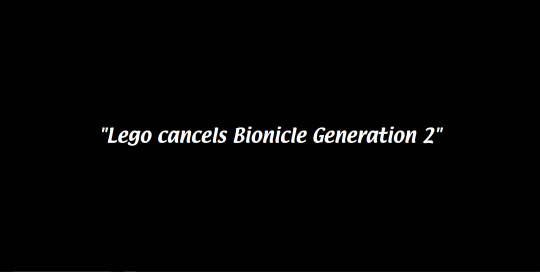
78 notes
·
View notes
Text
A small thing from the Sonic trailer that I love is how Shadow fights. This is something that I've REALLY started focusing on since Sonic Prime, so I'm going to try to talk about it like I'm not just losing my mind lol.
I noticed in Sonic Prime that they put effort into making Shadow and Sonic look different while fighting. It honestly took until I wrote this whole essay that I never published about Shadow's air shoes and how he clearly uses them to boost his strength - hence why his most well known fighting move in the roundhouse kick. With the air shoes behind it and his natural, unnatural strength, the roundhouse kick would/should KO basically every standard enemy he would come across.
Shadow is a very physical fighter in Sonic Prime.
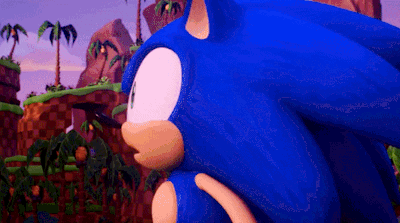
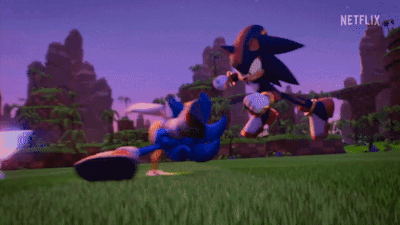
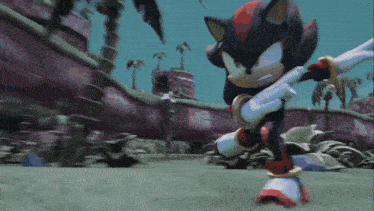
Yeah, Sonic uses force when destroying robots and things, too, but he clearly relies on his speed and spindash more to propel him through enemies rather than just obliterate them. I noticed this a lot in Sonic Prime and I LOVED it.
I love this move to differentiate them more - I don't think they've really done that in the games since Shadow the Hedgehog (2006) tbh and it was definitely a bummer to get through the Shadow levels in Sonic Forces and basically feel like it was just a Shadow skin over a Sonic level. I really hope that Generations has some Shadow combat abilities and not JUST the Doom Powers lol.
Which leads me to the Sonic 3 Trailer, as all things do today.
Shadow's scenes are very physical in the Sonic 3 trailer. The very first thing he does is bust out of the containment unit (alas I couldn't find a gif of it lol).
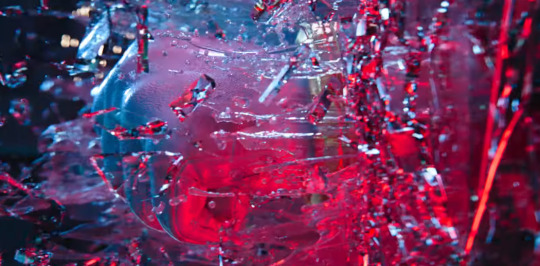
And then he goes into the roundhouse kicks (thank you Shadow 2005) and, as I stated above, those kicks pack a PUNCH.

Those soldiers are FLYING across the room lol.
Then there's everything from the First Encounter, starting with snapping Knuckles' wrist like kindling and ending with him rocketing Sonic into the ground in a chokehold.
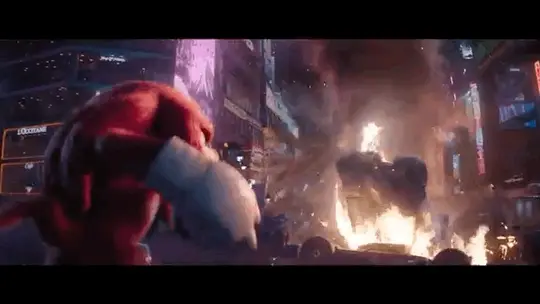
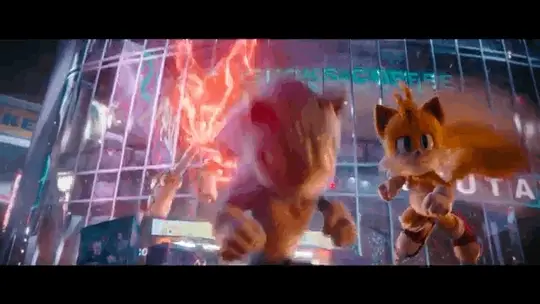

Again - using his shoes to his advantage in fighting. I love to see it!!
Shadow moves fast and brutally and it takes a lot for Sonic to deal with him. Even in Sonic Prime, when they're not trying to kill each other, fighting Shadow in S1 before the Shatter took all of Sonic's attention. Once Shadow focuses on destroying Sonic in the movie, I expect a LOT of super intense fight scenes like the one we saw in the trailer.
Even Shadows movement in the movie is more physical. Sonic always makes running look effortless:
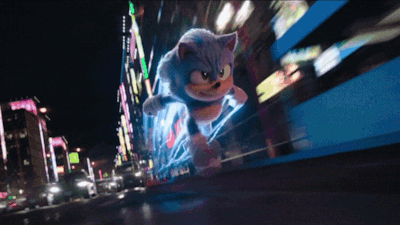
While Shadow looks like he's putting strength behind his skating:
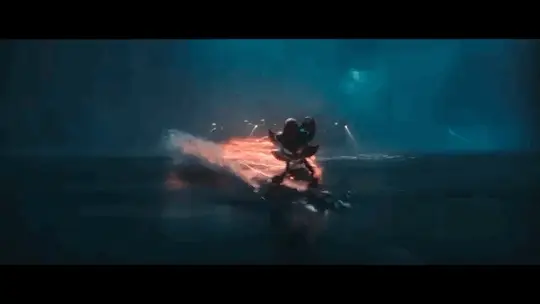
They did this in Prime, too:

I really hope that we get to see even more of this distinction between the two and if the rumors of more spinoffs are true, I would love to see something like Sonic Prime where they get to work together using their differences, like how they've really pushed the differences between Sonic and Knuckles.
I'm deeply in love with the Paramount Sonic Team and I honestly haven't felt like they've missed (yes, I even loved the Knuckles show). I'm so happy to see all of these parallels in the trailer and I can't WAIT to see how it all comes together in the movie!
103 notes
·
View notes